#World Food Programme
Text
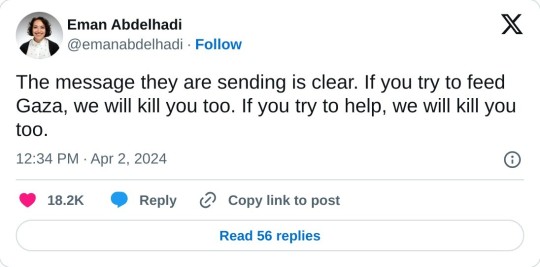
#yemen#jerusalem#tel aviv#current events#palestine#free palestine#gaza#free gaza#news on gaza#palestine news#news update#war news#war on gaza#unrwa#world food programme#world central kitchen#famine#gaza genocide#genocide
3K notes
·
View notes
Text
Live coverage of the 20th of February 2024 is now closed.
Here is a recap of today's major events.

It is 12am in Ireland now so I have to go to bed.
I'll be back to resume live updates on Thursday.
For continuous updates while I'm gone, click the link below:
#free gaza#free palestine#gaza strip#irish solidarity with palestine#palestine#gaza#news on gaza#al jazeera#boycott israel#israel#USA#UNSC#Algeria#World Food Programme#Jenin#West Bank#West Bank Palestinians#Hamas#Islamic Jihad#Colombia#Brazil#Gustavo Petro#luis inacio lula da silva#philippe lazzarini#Summary#Recap#Current events#Latest news#News#Goodnight
4K notes
·
View notes
Text
(Dec. 12) [Article] by Hind Khoudary
Article title:
Diary from Gaza: 'If death doesn’t come from airstrikes, it will come from starvation
Article subtitle:
Hind Khoudary, with the World Food Programme in Gaza, recounts hard days in the strip during and after a brief humanitarian pause
Article text:
After seven weeks of relentless bombardment that left 80 percent of Gaza's population – 1.8 million people – displaced, trapped and acutely hungry, a week-long humanitarian pause came into effect offering a temporary respite and allowing some aid into the small, decimated and fully-deprived enclave where food, water, medicine and any of life's necessities are dangerously low.
Hind, a native of Gaza, has made it her life's mission to share the stories of her people. In this account, she bears witness to the suffering befalling Gaza and how she and others are surviving. For weeks, Hind reported on life in Gaza. Below, she shares her story of displacement, the loss of her home, days without food, losing hope and finding it again.
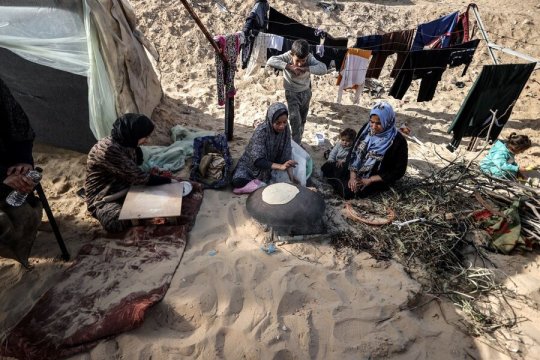
Caption: A displaced Palestinian family now living in a makeshift camp in southern Gaza without water, electricity, or enough food. Photo: WFP/Ali Jadallah
24 November
I woke up today to an unfamiliar silence. The absence of warplanes, drones and bombs. The uncertainty that it would last felt uneasy.
On the first day of the temporary pause, our footsteps led us to the Al Aqsa Martyrs hospital, where ambulances were transporting civilians wounded by gunshots on a road that was supposed to be safe. “We wanted to go back home,” a man with an injury in his right leg screamed.
People were shouting, doctors were in a rush trying to save those injured in their lower limbs from amputation. The hospital’s floors, once pristine, were now painted in the shades of spilled blood. As I looked around at the blood-soaked ground, I couldn't help but question, “Where is the ceasefire?”
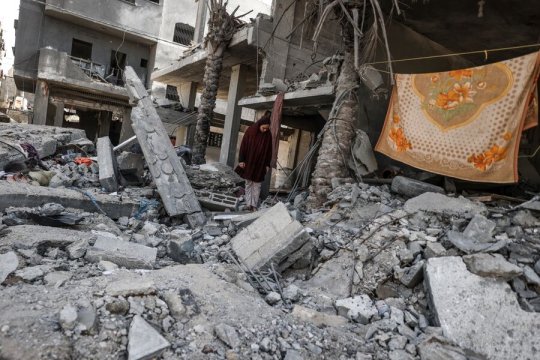
Caption: Non-stop bombardment has decimated homes and buildings in Gaza, with families now living amid the rubble and searching for debris to make a fire to cook. Photo: WFP/Ali Jadallah
On that day at least 17 Palestinians were injured. Yet, as the day unfolded, an unsettling normalcy settled in – a silence that didn’t seem to care for the ruthless acts that left dozens of Palestinians dead or injured on the supposed respite's very first day.
In the midst of the heart-wrenching scenes, I decided to seek solace at the shore of Gaza, yearning for the calm sight of the sea and the soothing rhythm of the waves. The shore that I had been a stranger to for six weeks. Barefoot on the sand, I took a deep breath. All I hope for is an end to the violence.

Caption: The author and Palestinian families enjoy some respite on the shore of Gaza on the first day of the humanitarian pause (24 November). Photo courtesy of the author
Children were swimming in the sea, laughing and playing – seemingly oblivious to the war. Gazans used to gather at the sea for picnics with friends and family, but today there were none. The absence of any food underscored the stark contrast between the ordinary joys of life and the grim reality of conflict.
25 November
The humanitarian pause agreement was meant to allow aid into the Gaza Strip. And yet, the supermarket shelves were empty. People were searching for salt, yeast and wheat flour to make bread. Everyone was desperately searching for ways to bring bread back into their lives, in supermarkets or on the streets – but no one can find.
A sign stapled on a supermarket entrance read: “WE DO NOT HAVE YEAST OR SALT”.
We went to Deir El Balah’s marketplace searching for food, but we could not find any. Tomatoes, cucumbers, onions, eggplant and oranges are all you can find. We even searched for winter clothes and blankets; we also did not find any.
If some supermarkets had anything at all on their shelves, it was soap and shampoo.
People are still going to shops, navigating aisles in the hope of finding anything they can return with to their children yearning for sweets. But how do you soothe a child crying for chocolate when you cannot even make them bread?
There is not enough food or aid reaching all of the people in the Gaza Strip.


Caption: In in Deir El Balah people crowd a market searching for food, while shop shelves are empty. Photo: WFP/Ali Jadallah
6:00 pm:
I found out my home was bombed from a video shared by someone on Instagram. I am still in denial. I won’t believe it until I see it with my own eyes. But I can’t.
Home is a couple of minutes away, but I cannot even go search for my belongings because people are restricted from going there. Gaza has been a besieged enclave since 2007 and Palestinians have had to deal with the lack of freedom in moving within the Strip or leaving it.
A temporary ceasefire without going back home was cruel. It is not only me. “Can we go back to our homes?”, is the only question everyone is asking. Not being able to go back home made me sad and depressed.
But not being able to mobilize from the north to the south of Gaza has been suffocating more than bombardment.
During the seven-day humanitarian pause, WFP and partners managed to scale-up assistance and reach people in areas that were cut off from aid for weeks. Hundreds of humanitarian aid trucks crossed into Gaza, but this was not enough in the face of the catastrophe unfolding.
Then the fighting resumed once again, and with it, more displacement, the risk of famine, and disease.
1 December
On 7am on Friday morning, we woke up to the sound of explosions and drones buzzing in the sky.
We knew it was coming, but no one was ready for all of that to start again after seven days of calmness without the buzzing noise of drones.
Israeli warplanes started launching multiple air raids across Gaza, targeting residential areas everywhere in Gaza. Explosions have not stopped since the resumption of the fighting. Artillery shelling, drones, warplanes, gunboats fire have not stopped.
In the first 24 hours reports say at least 200 Palestinians were killed. Thousands remain under the rubble where the civil defence teams can’t rescue all of these people.
However, the Israeli forces published a map with block numbers. Every area was given a block number, where they will start giving each block instructions to evacuate. But no one knows which block their home has been assigned and no one knows where to go. They run from one area being bombed to another.
People were frustrated and terrified, they were already displaced from their homes to areas in Gaza that they were told would be safe. But the reality is this: in Gaza no place is safe. People are fleeing from one death to another.
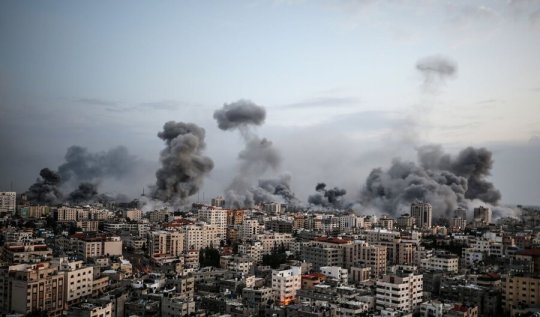
Caption: Relentless bombardment on Gaza has displaced more than 85 percent of the population. Photo: WFP/Ali Jadallah
If death doesn’t come from airstrikes, it will come from starvation.
Today, we were sharing a bottle of juice that a friend managed to find. We were rationing it among ourselves when a massive explosion unexpectedly occurred close to where we are staying, we ran into each other fearing another explosion. This was the last bottle of juice we had in stock. I hadn’t managed to take a sip.
Today, I was intensely hungry. The only thing I could find was zaatar (thyme) and some bread that my friend’s mother made over firewood. To secure some wheat flour to bake bread, families can pay astronomical amounts of money. In one area inside Gaza, a bag of wheat flour – a rare find these days – was 400 NIS (US$ 107).
Food options are now a thing of the past. We no longer have a choice of what to eat, we eat what is available.
I yearned for something sweet. It has been so long without anything that I have forgotten the taste of pancakes with bananas.
4 December
We have officially run out of food. We went to the market to look for something to to eat and returned with cucumbers. We are drained, dehydrated, starving and cold.
People in Gaza city do not even have the freedom to search for food. Anyone who moves would be risking their lives. Neighbours have opened their doors to share whatever they have between them.
Now that the middle area of Gaza has been cut off, no aid has entered. People were asking to move but we have no way to leave and nowhere to go. The situation has been devastating more than ever.
We are starving. We are trapped. We are under non-stop explosions, airstrikes, artillery shelling, gunboat fire. Everything, everywhere, all at once.
We have no access to water - even dirty water - electricity, food, nothing.

Caption: Gazans forced to live in makeshift camps in southern Gaza line up to fill water in jerry cans. Photo: WFP/Ali Jadallah
Yesterday the first meal we had was at 8 pm. I was hungry all day long but I didn’t tell anyone because everyone was hungry too.
Today, in the morning, we had some bread for breakfast. But I cannot help but think “When will this end? When will we go home?“- despite our homes being bombed. Nothing exists. Nothing feels the same. It’s raining now, I just heard an airstrike.
People are tense, fragile and cold. They don’t have winter clothes, when they evacuated, they did not have time to take any of their clothes, belongings, loved things.
Me too. When I went out of the house, I went as if I was going to work and coming back. I ended up never coming back again.
Everything is heart-breaking and overwhelming. All of these babies, and children and dead bodies.
I hate the sirens of the ambulance. I hate seeing it rain because I know everyone is shivering, it is very cold.
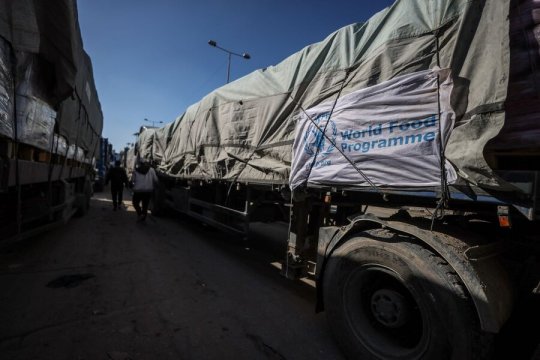
Caption: The food brought in during the humanitarian pause was not enough to meet the soaring needs of the people of Gaza. Photo: WFP/Ali Jadallah
We haven't had electricity since the first couple of days. I forgot what electricity means.
I miss sleeping on my bed. I miss my mom. I miss my family. I didn’t get to see them for more than two hours in the past 60 days.
The violence is increasing day after day. More people are being killed, starved. We are witnessing all of this and we can’t do anything.
It’s heart-breaking to live through this with no end in sight. It is hard for me to accept that I cannot do anything but witness this carnage with everyone else in the Gaza Strip.
75 notes
·
View notes
Text
Another update
2/20/2024
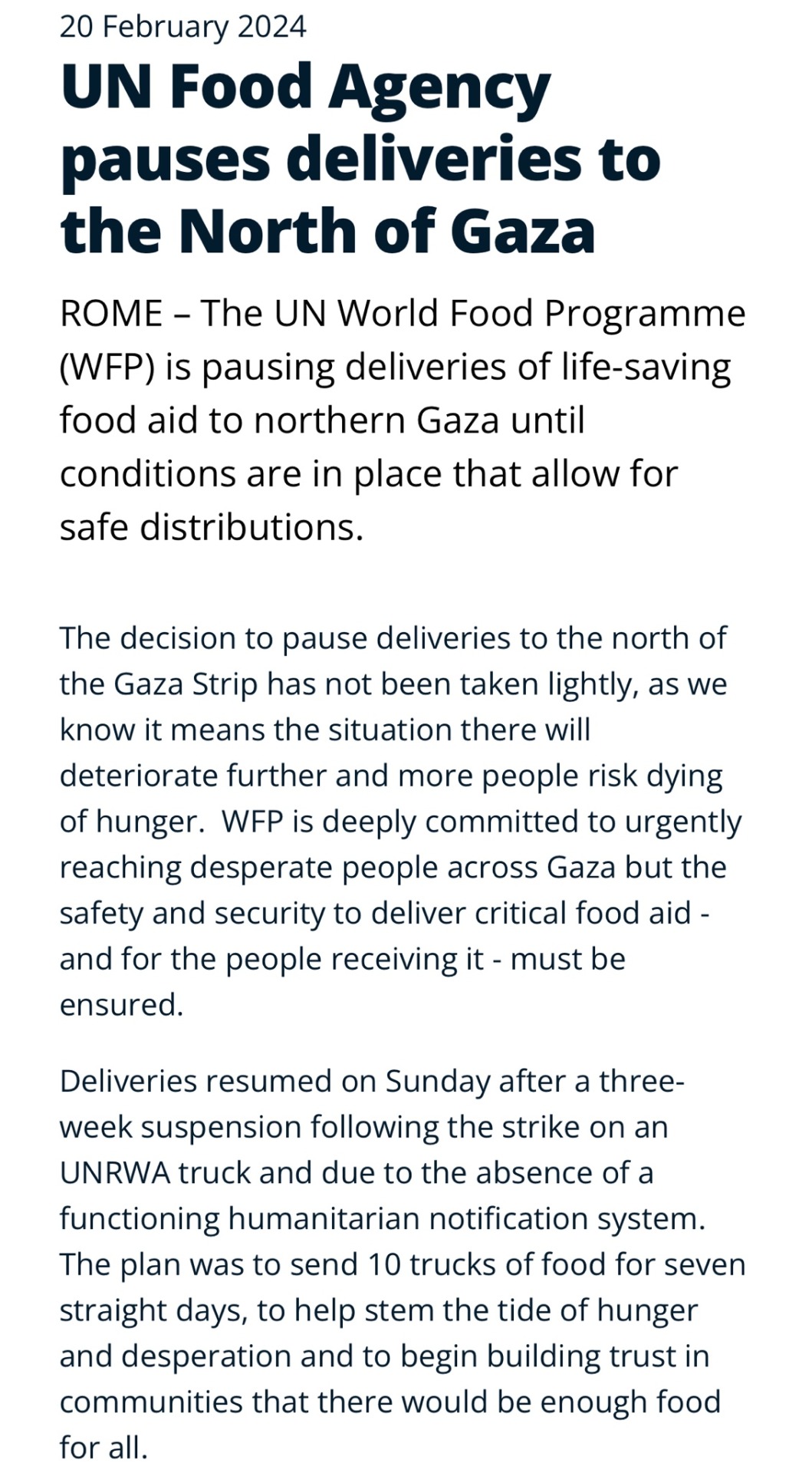
[ID: Article by WFP:
20 February 2024
UN Food Agency pauses deliveries to the North of Gaza
ROME – The UN World Food Programme (WFP) is pausing deliveries of life-saving food aid to northern Gaza until conditions are in place that allow for safe distributions.
The decision to pause deliveries to the north of the Gaza Strip has not been taken lightly, as we know it means the situation there will deteriorate further and more people risk dying of hunger. WFP is deeply committed to urgently reaching desperate people across Gaza but the safety and security to deliver critical food aid - and for the people receiving it - must be ensured.
Deliveries resumed on Sunday after a three-week suspension following the strike on an UNRWA truck and due to the absence of a functioning humanitarian notification system. The plan was to send 10 trucks of food for seven straight days, to help stem the tide of hunger and desperation and to begin building trust in communities that there would be enough food for all. ]
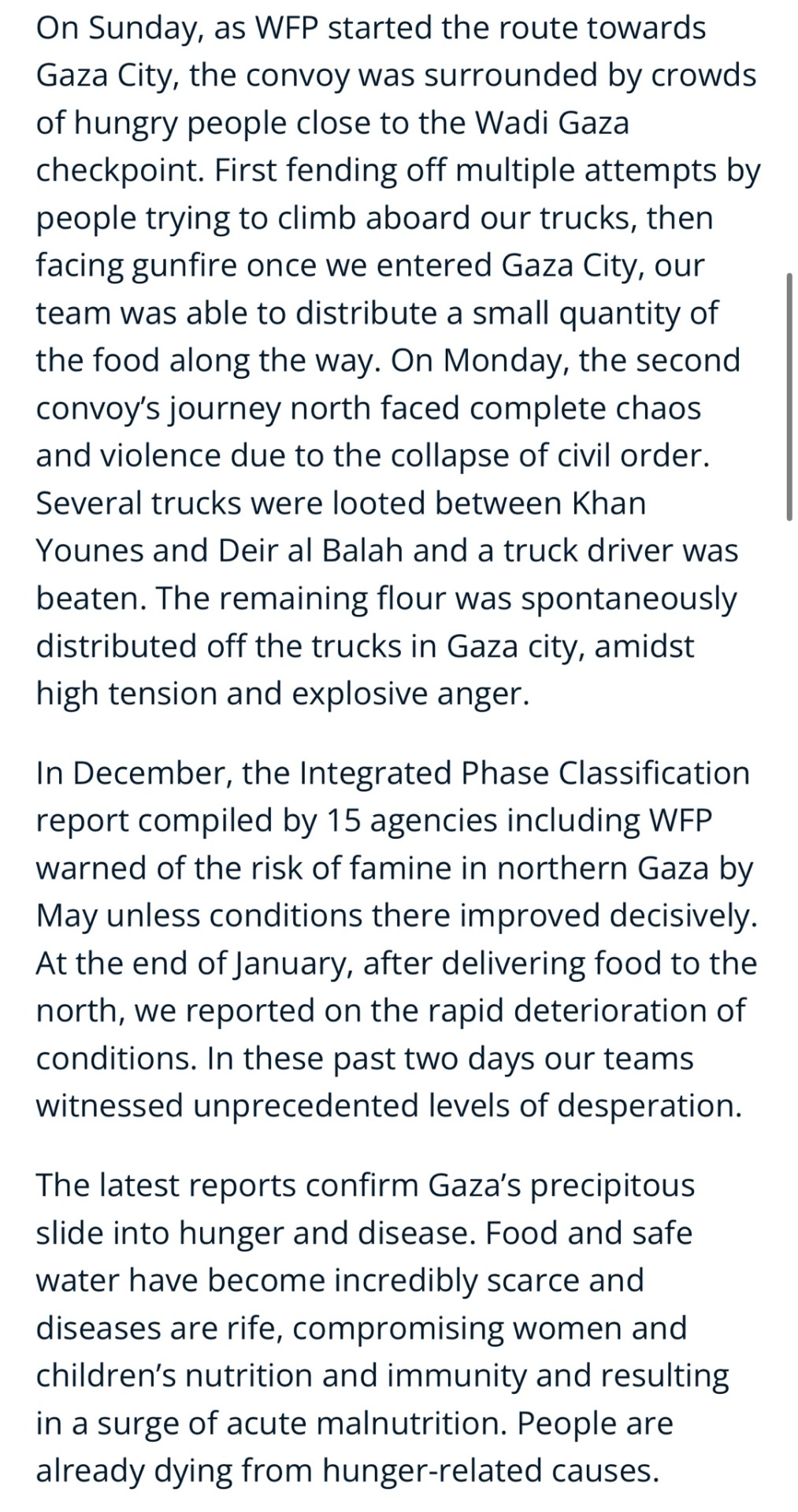
Continued:
[ID: Continuation of article by WFP: On Sunday, as WFP started the route towards Gaza City, the convoy was surrounded by crowds of hungry people close to the Wadi Gaza checkpoint. First fending off multiple attempts by people trying to climb aboard our trucks, then facing gunfire once we entered Gaza City, our team was able to distribute a small quantity of the food along the way. On Monday, the second convoy’s journey north faced complete chaos and violence due to the collapse of civil order. Several trucks were looted between Khan Younes and Deir al Balah and a truck driver was beaten. The remaining flour was spontaneously distributed off the trucks in Gaza city, amidst high tension and explosive anger.
In December, the Integrated Phase Classification report compiled by 15 agencies including WFP warned of the risk of famine in northern Gaza by May unless conditions there improved decisively. At the end of January, after delivering food to the north, we reported on the rapid deterioration of conditions. In these past two days our teams witnessed unprecedented levels of desperation.
The latest reports confirm Gaza’s precipitous slide into hunger and disease. Food and safe water have become incredibly scarce and diseases are rife, compromising women and children’s nutrition and immunity and resulting in a surge of acute malnutrition. People are already dying from hunger-related causes. ]
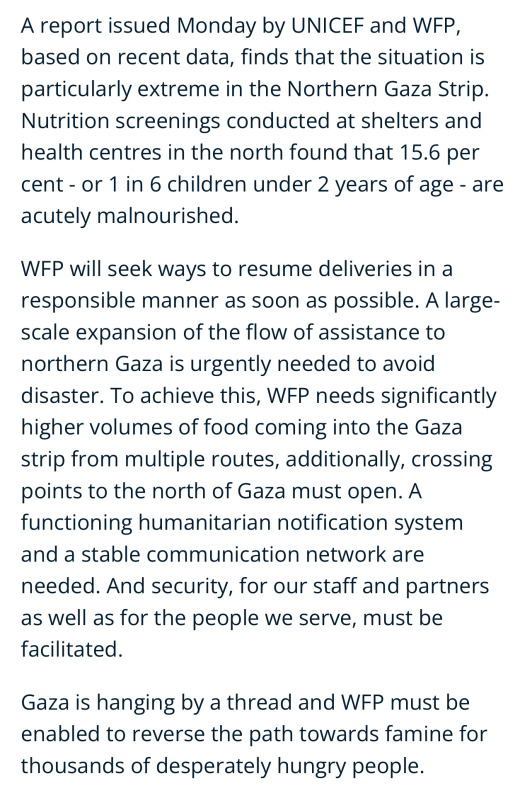
[ID: Continuation of article by WFP:
A report issued Monday by UNICEF and WFP, based on recent data, finds that the situation is particularly extreme in the Northern Gaza Strip. Nutrition screenings conducted at shelters and health centres in the north found that 15.6 per cent - or 1 in 6 children under 2 years of age - are acutely malnourished.
WFP will seek ways to resume deliveries in a responsible manner as soon as possible. A large-scale expansion of the flow of assistance to northern Gaza is urgently needed to avoid disaster. To achieve this, WFP needs significantly higher volumes of food coming into the Gaza strip from multiple routes, additionally, crossing points to the north of Gaza must open. A functioning humanitarian notification system and a stable communication network are needed. And security, for our staff and partners as well as for the people we serve, must be facilitated.
Gaza is hanging by a thread and WFP must be enabled to reverse the path towards famine for thousands of desperately hungry people. ]
WFP: Source
23 notes
·
View notes
Text

🇺🇳🇵🇸 🚨 UNITED NATIONS WORLD FOOD PROGRAMME WARNS GAZANS FACE IMMEDIATE STARVATION
The United Nations' World Food Programme warned Friday that Palestinian civilians living in the Gaza Strip face immediate starvation and dehydration as the Israeli Occupation continues operations targeting Gaza.
The comments come as part of a United Nations World Food Programme press conference held on Friday morning.
"Palestinians in the Gaza Strip are becoming more desperate everyday in the search for bread and other essential foods," World Food Programme Senior Spokesperson for the Middle East, North Africa and Eastern Europe, Abeer Etefa said.
Etefa told the press conference, "We are already starting to see cases of dehydration and malnutrition which is increasing rapidly and by the day. So Gaza actually risks sliding into hunger heavily without fuel and a rapid surge in food supplies."
According to Etefa, only 10% of necessary food supplies are entering the Gaza Strip at this time, and she told the conference that Gaza is facing a major food gap.
"So 2.2 million people, that's nearly the entire population of Gaza are now in need of food assistance," the spokesperson warned.
"People are barely able to have a meal a day. Food options are limited to canned food, if it is actually available, bread is a rare luxury and aid trucks are trickling into Gaza, but even the small amounts of food and water that make it over the border are barely able to be transported to where it needs to go as roads have been damaged or fuel is in very short supply."
Etefa went on to say that the existing food systems inside the besieged Gaza Strip are collapsing and food production has come to a complete halt since the events of October 7th.
"Fisherman cannot access the sea, Farmers cannot reach their farms, and the last bakery that the World Food Programme has been working with has closed its doors because of the shortage of fuel," Etefa explained.
"Shops have run out of food supplies, the bakeries are unable to operate because of the fuel, shortage of clean water or because they have sustained damage, and the last mill that was also operating to make... the wheat flour that's needed for baking bread has been hit [in an Israeli strike] and has stopped operating."
Etefa goes on to explain how all these problems have led to bread shortages, which she called the "last staple food for people in Gaza" and pointed to the lack of electricity supply as one of the main culprits for the desperation of the situation.
Etefa goes on to explain how perishable food items are not available, nor are they really an option due to the lack of electricity and fuel which prevents refrigeration.
According to Etefa, at the beginning of the conflict, the United Nations World Food Programme (WFP), working alongside its partner agency, the United Nations Relief and Works Agency (UNRWA), partnered with 23 bakeries at the start of the conflict and have been providing bread for over 200'000 Gazans every morning.
"This is now over," Etefa stated plainly, "because all of the 23 bakeries are now out of service."
According to the spokesperson, at the start of the war there had been over 130 bakeries in Gaza, with more than 11 having been targeted in Israeli Occupation strikes, including one which had been contracted by the WFP, while the rest are effectively closed due to shortages of fuel.
"In general, 25% of the shops in Gaza, those ones that have been contracted by WFP remain open and others have run out of essential food items," the spokesperson explained.
"But even the ones that remain open have very limited supplies in the stores, the local markets have shut down completely, small quantities of food can be found, but they are being sold at alarmingly inflated prices and are of little use without fuel and cooking gas."
This means that most Palestinians living in Gaza are surviving on less than one meal a day, and the lucky ones may have a meal that includes canned food, however, many people have resorted to consuming raw onions and eggplants, as well as other foods that are normally cooked.
Etafa explains how it is impossible for the light trickle of Humanitarian Aid being allowed to enter Gaza by the occupation to make up for the complete halt of commercial operations in the Gaza Strip.
Etefa mentioned that since October 21st, the first day the Occupation allowed aid through the Raffah border crossing, 1'129 trucks loaded with aid have been allowed into Gaza.
However, of those 1'129 trucks carrying aid, only 147 of them were carrying food supplies.
"The volume remains very inadequate," Etefa told the audience.
According to the WFP spokesperson, since the Raffah border crossing was opened for emergency aid, more than 400 trucks were crossing into Gaza each day. However, now that number has been reduced to closer to 100 per day, and of those 100 trucks, only an estimated 10% contain food imports.
"That means that the food that has entered Gaza so far is only enough to meet 7% of the people's daily minimum of the caloric needs," Spokesperson Etefa explained.
"With winter fast approaching and the unsafe and overcrowded shelters, the lack of clean water, people are facing the immediate possibility of starvation," a stunning comment from the spokesperson.
According to WFP Spokesperson Abeer Etefa, aid has so far been delivered to around 764'000 people in Gaza and the West Bank, including food parcels and electronic vouchers, and assisted another 500'000 staying in UN shelters with bread, canned tuna fish, and date bars.
Another 520'000 people were provided with electronic vouchers at the beginning of the crisis, however the vouchers have become worthless as food, water and fuel have virtually disappeared over the last week and nothing remains in the shops for civilians to purchase.
Though, according to Etefa, the World Food Programme intends on scaling up operations in Gaza in the coming days with a goal of reaching 1 million people with aid by December.
However, for that to happen, the Israeli Occupation would have to allow many more trucks with Humanitarian Aid through the Raffah border crossing and other areas of access to Gaza.
"We need more than just one crossing point," Etefa told the audience.
"We need the safe access of Humanitarian Aid workers to distribute assistance and for the civilians to have safe access to the assistance, fuel for trucks, fuel for bakeries; so that we can continue to provide this staple food commodity and to be operational and, of course, connectivity to facilitate delivery of assistance, and the ability to rotate staff in and out of Gaza so that we can beef up our capacity on the ground and give relied to the people who have been working for the last few weeks tirelessly."
In a blunt assessment of the situation, Etefa said, "There is no way to meet the current hunger needs with the current situation."
"The collapse of food supply chains is catastrophic, it's a catastrophic turning point in an already very bad situation," Etefa concludes.
"Gaza was not an easy place to live before the 7th of October, and if the situation was difficult before this conflict, it's now disastrous."
#source
@WorkerSolidarityNews
#gaza#gaza strip#gaza news#gaza war#gaza update#palestine#palestine news#palestine war#palestine update#united nations#world food programme#israel#israel news#israeli war crimes#war crimes#crimes against humanity#war#news#politics#geopolitics#war news#war update#world news#global news#international news#breaking news#current events#wars#UN#us news
45 notes
·
View notes
Text
The UN will be cutting food aid to Yemen and enforcing collective punishment because Yemen is standing by Palestine. This is a war crime & a breach of international humanitarian law.
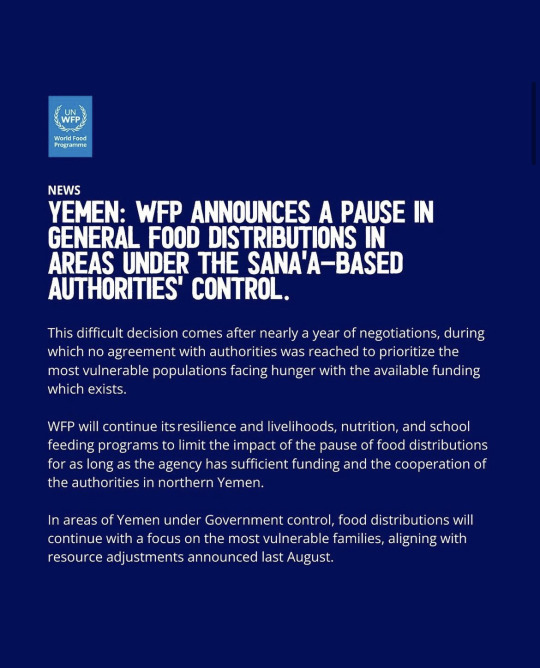
#free palestine#yemen#free yemen#united nations#world food programme#very convenient timing ‘negotiations for a year’ i hope the UN burns#tag: important#collective punishment is a fucking war crime this is insane#and LYING like just horrible genocidal cowards unbelievable
23 notes
·
View notes
Text
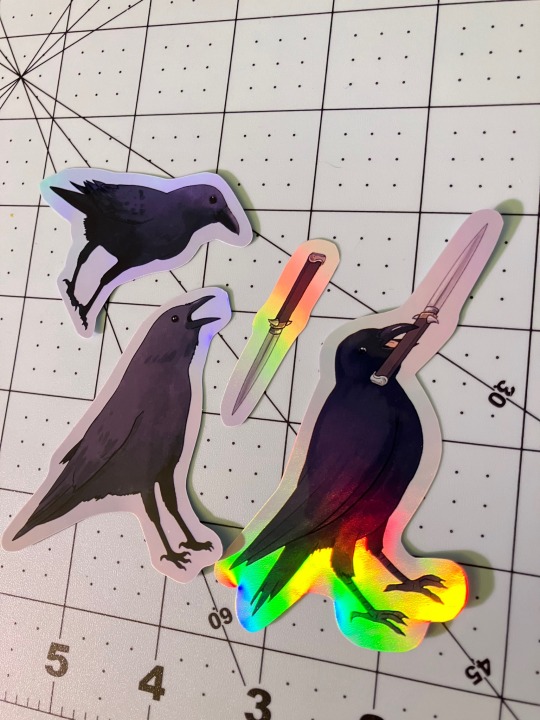
Heads up: Proceeds from the sales of these Crow Fam stickers go to the World Food Programme!
Flapjacks, Waffles, and Knife Crow are here to support feeding those in need. They’re big fans of food! They think everyone should have some!
#charity#world food programme#crows#crow stickers#corvids#crow fam#crow friends#stickers#holographic stickers#I just realized I wrote half in the store post#ignore that that was me trying to figure out how to say proceeds go towards it but the rest covers the cost of making the stickers/mail#I’m dumb sorry
19 notes
·
View notes
Text
ROME/GENEVA/NEW YORK – As the risk of famine grows, and more people are exposed to deadly disease outbreaks, a fundamental step change in the flow of humanitarian aid into Gaza is urgently needed, United Nations agencies warned today. The heads of the World Food Programme (WFP), UNICEF and the World Health Organization (WHO) say that getting enough supplies into and across Gaza now depends on: the opening of new entry routes; more trucks being allowed through border checks each day; fewer restrictions on the movement of humanitarian workers; and guarantees of safety for people accessing and distributing aid.
Without the ability to produce or import food, the entire population of Gaza relies on aid to survive. But humanitarian aid alone cannot meet the essential needs of the Gaza people. The United Nations, international aid agencies and non-governmental organizations have so far managed to deliver limited humanitarian assistance in Gaza, despite extraordinarily difficult conditions, but the quantities fall far short of what is needed to prevent a deadly combination of hunger, malnutrition, and disease. The shortage of food, clean water, and medical assistance is particularly severe in the northern areas.
Humanitarian action is seriously limited by the closure of all but two border crossings in the south and the multi-layered vetting process for trucks coming into Gaza. Once inside, efforts to set up service points for people in need are hampered by bombardments and constantly shifting battle fronts, which endanger the lives of ordinary Gazans and the UN and other humanitarian personnel striving to help them.
“People in Gaza risk dying of hunger just miles from trucks filled with food,” said WFP Executive Director Cindy McCain. “Every hour lost puts countless lives at risk. We can keep famine at bay but only if we can deliver sufficient supplies and have safe access to everyone in need, wherever they are.”
The latest Integrated Food Security and Nutrition Phase Classification (IPC) report found devastating levels of food insecurity in Gaza and confirmed that the entire population of Gaza – roughly 2.2 million people – are in crisis or worse levels of acute food insecurity. Virtually all Palestinians in Gaza are skipping meals every day while many adults go hungry so children can eat, and the report warned of famine, if current conditions persist.
WFP has been providing food to people inside Gaza every day since 7 October and reached more than 900,000 people with food assistance in December. This has required pivoting to new ways of operating with local partners, including finding safe sites for distributions, channelling wheat flour into bakeries so that they can resume production, and distributing special food supplements to help children fight off malnutrition. On Thursday, WFP’s first food convoy to North Gaza since the humanitarian pause delivered food supplies for around 8,000 people.
The conflict has also damaged or destroyed essential water, sanitation and health infrastructure and services and limited capacity to treat severe malnutrition and infectious disease outbreaks. With Gaza’s 335,000 children under 5 years of age especially vulnerable, UNICEF projects that, in the next few weeks, child wasting, the most life-threatening form of malnutrition in children, could increase from pre-crisis conditions by nearly 30 per cent, affecting up to 10,000 children.
“Children at high risk of dying from malnutrition and disease desperately need medical treatment, clean water and sanitation services, but the conditions on the ground do not allow us to safely reach children and families in need,” said UNICEF Executive Director Catherine Russell. “Some of the material we desperately need to repair and increase water supply remain restricted from entering Gaza. The lives of children and their families are hanging in the balance. Every minute counts.”
UNICEF has been warning since November that children in southern Gaza are accessing only 1.5 to 2 litres of water per day, well below the recommended requirements for survival. To address this, UNICEF and partners have provided safe drinking water to over 1.3 million people, but much more is needed to address the desperate conditions. UNICEF has also provided medical supplies, including 600,000 doses of vaccine, nutritional supplements and vitamins to children and pregnant women, and humanitarian cash transfers to over 500,000 households.
Since the start of the hostilities, WHO and partners have been supporting the health system in Gaza with deliveries of medical equipment and supplies, medicines, fuel; coordination of emergency medical teams; and disease surveillance. There have been more than a dozen high-risk missions to deliver supplies to hospitals in northern and southern Gaza. WHO and partners helped establish two kitchens at Al-Shifa hospital, now serving 1200 meals a day and delivered medical supplies to support treatment for up to 1,250 children with severe acute malnutrition, and the establishment of therapeutic feeding centres.
“People in Gaza are suffering from a lack of food, water, medicines and adequate healthcare. Famine will make an already terrible situation catastrophic because sick people are more likely to succumb to starvation and starving people are more vulnerable to disease”, said WHO Director-General Dr Tedros Adhanom Ghebreyesus. “We need unimpeded, safe access to deliver aid and a humanitarian ceasefire to prevent further death and suffering.”
Israeli authorization to use a working port close to the Gaza Strip and border crossing points into the north is critically needed by aid agencies. Access to Ashdod port, roughly 40 km to the north, would enable significantly larger quantities of aid to be shipped in and then trucked directly to the badly affected northern regions of Gaza, which few convoys have managed to reach.
“The flow of aid has been a trickle in comparison to a sea of humanitarian needs,” said Phillipe Lazzarini, Commissioner General for the UN Palestine Refugee Agency (UNRWA). “Humanitarian aid will not be enough to reverse the worsening hunger among the population. Commercial supplies are a must to allow the markets and private sector to re-open and provide an alternative to food accessibility.”
The three agency heads emphasize the urgent need to lift the barriers and restrictions on aid delivery to and within Gaza, and for commercial traffic to resume. They reiterate the call for a humanitarian ceasefire to enable this vitally important roll-out of a massive, multi-agency humanitarian operation.
#palestine#free palestine#save palestine#gaza#free gaza#save gaza#world news#current events#israel palestine conflict#israel#israeli apartheid#palestinian genocide#gaza strip#gazaunderattack#gaza genocide#ceasefire#humanitarian aid#humanitarian crisis#world food programme#unicef#world health organization#middle east
16 notes
·
View notes
Text
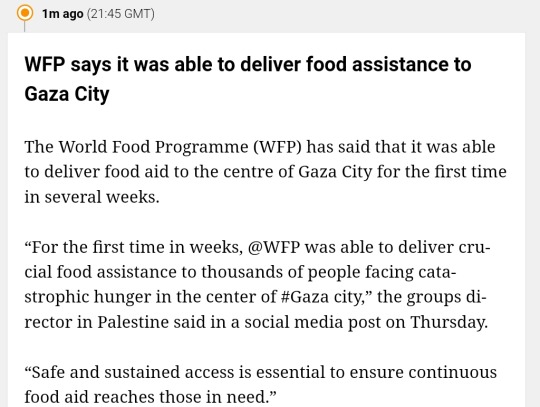
The World Food Programme finally got some food to the center of Gaza City after weeks
#free gaza#free palestine#gaza strip#irish solidarity with palestine#palestine#gaza#news on gaza#al jazeera#boycott israel#israel#World Food Programme#Humanitarian crisis
64 notes
·
View notes
Text
gentle reminder that freerice.com still exists 🍚
23 notes
·
View notes
Text
UN warns 50 million across West and Central Africa facing hunger
The UN on Tuesday suggested a record 49.5 million people will go hungry in West and Central Africa next year due to conflict, climate change and high food prices, Reuters reports.
This figure is 4 per cent higher than in 2023. In coastal countries, the number of people suffering from acute hunger will reach 6.2 million in 2024, up 16% from this year, according to a new regional food security analysis published by the UN World Food Programme (WFP) and other humanitarian organisations. Margot Vandervelden, WFP’s acting regional director for Western Africa, noted:
Acute hunger remains at record levels in the region, yet funding needed to respond is not keeping pace. Insufficient funding means the moderately hungry will be forced to skip meals and consume less nutritious food, putting them at risk of falling back into crisis or emergency phases, perpetuating the cycle of hunger and malnutrition.
Read more HERE
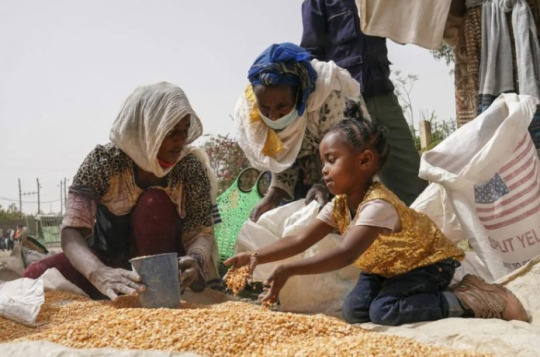
#world news#world politics#news#united nations#world food programme#west africa#south africa#africa#starv1ng#hungry#famine#war#refugees
4 notes
·
View notes
Text
Summary of this long-ass post: If u wanna join my Freerice Group, the joining code is: 2ZJPCWMH and anyone & everyone is welcome to join!
This is probably incredibly sick and f*cked-up of me and like a very vile part of my ED-brain, but one way I try to assuage the intense guilt I feel from restricting/fasting (seemingly) by choice, while there are devastating & unspeakably horrific hunger & starvation crises occurring throughout the world, is by spending my free time doing those "click-to-help" donation site thingies to fund aid and food donations to starving populations (the two I use most are Arab.org in their Click-To-Help section https://arab.org/click-to-help/palestine/ and The Hunger Site (although I have read some very sus things about them on reddit??? I only really resort to this one bc my middle school health teacher had us do this one every day for a week, so I implicitly trusted her judgment for years bc she was known for having 6 prior mar!juana possessions on her record).
Anyways, the other thing I do daily is I play the Freerice game (you can find it on the World Food Programme Website). It's a free trivia game where as you play, you generate donations (the site was previously were funded purely by ads, but recently they were able to acquire several large sponsors to cover the donations instead, since they said it's more consistent and reliable that way) for the World Food Programme, which uses the money to organize and distribute food aid all over the world-- but especially to populations suffering from emergency-level food insecurity and starvation rates (such as in Palestine, South Sudan, Democratic Republic of the Congo, etc-- there's a list on the WFP website of the areas that are under the "Emergencies" section).
p.s. The "grain of rice" in the game don't represent actual real grains of rice, they're just a conceptual representation to help you visualize the worth of your donations adding up.
anyways. So what my mentally ill brain does is: for every "bowl of rice" (a certain donation amount) I do on Freerice, my ED-ass thinks, "Oh good, for every 'bowl' I 'fill' it's literally keeping me distracted from binge-eating and INSTEAD, all the food I COULD have been eating in that time I was playing-- I can use that distraction from eating to generate legit food donations for real starving people who actually WANT to eat and desperately NEED the nutrition. As far as coping-mechanisms go, this one isn't so bad!"
That's how my brain-fogged, guilt-ridden mind works. I'm so ashamed of choosing to deny myself food, when I know for a fact that there's stuff going on in the world like the Israeli government using forced-starvation as a tool to commit genocide against Palestinians by creating and maintaining a man-made famine. So i try to mentally justify my ED behavior by imagining that the time i spend not-eating while playing Freerice is a way of somehow magically transferring my ~potential food ingestion~ to another person somewhere else who ACTUALLY needs it.
ANYWAYS, my point to all this rambling is that I wanted to offer my Freerice Group Code to anyone on EDblr (or just anyone in general) who might want to join my Group and collectively track the donations we generate together :')
My Freerice Group name is "Rat Terrier Devotees" (bc I have a Teddy Roosevelt Terrier lol) and the Group Code is: 2ZJPCWMH Please feel free to join (regardless if you're EDblr or not, obvi)!
#personal#rant#tw ed#tw eating dis0rder#tw mental illness#tw ed behavior#tw 3dblr#tw edblr#freerice#world food programme#south sudan crisis#democratic republic of the congo food emergency#free palestine#genocide in palestine#palestinian starvation crisis#imminent famine in palestine#food aid for Palestinians#freerice trivia game#click-to-help sites#tw food mention
2 notes
·
View notes
Text
[📹 Israeli occupation warplanes strike the coastal Rashid street in Gaza, a location where displaced civilians wait for the arrival of food aid trucks.]
🇮🇱⚔️🇵🇸 🚨
💥ISRAELI OCCUPATION BOMBS AREA FOR CIVILIANS TO RECEIVE AID AS UN AGENCIES WARN OF DISEASE AND STARVATION💥
📹 Israeli occupation warplanes strike the coastal Rashid street in Gaza, a location where displaced civilians wait for the arrival of food aid trucks.
At the same time, the United Nations' various humanitarian aid agencies published a press release warning of the deadly combination of hunger, malnutrition, and disease.
In the press release, the heads of the World Food Programme, UNICEF, the World Health Organization, warn that, without the ability to produce or purchase food, "the entire population of Gaza relies on aid to survive," meaning all 2.3 million people.
"But humanitarian aid alone cannot meet the essential needs of the people of Gaza," the statement says.
The agency heads say that despite what aid they have delivered into Gaza, despite "extraordinarily difficult conditions" the quantities "fall far short of what is needed to prevent a deadly combination of hunger, malnutrition and disease."
"The shortage of food, clean water, and medical assistance is particularly severe in the northern areas," the agency heads added.
The UN agency heads emphasize that aid access is severely limited by Israel's closure of all but two border crossings, through which all the aid, and the Israeli checks of every vehicle, must happen through the two crossings in the south.
Once inside, efforts to distribute aid are hampered by Israeli bombardments, "endangering the lives of ordinary Gazans, and the UN and other humanitarian personnel striving to help them."
“People in Gaza risk dying of hunger just miles from trucks filled with food,” said WFP Executive Director Cindy McCain. “Every hour lost puts countless lives at risk. We can keep famine at bay but only if we can deliver sufficient supplies and have safe access to everyone in need, wherever they are.”
The UN agency heads point to the latest Integrated Food Security and Nutrition Phase Classification (IPC) report, which found "devastating" levels of food insecurity.
"Virtually all Palestinians in Gaza are skipping meals every day while many adults go hungry so children can eat," the statement added, with report also warning of outright famine.
The WFP says that since October 7th, the food aid program has served over 900'000 Palestinians, but warns it's nowhere near enough.
"The conflict has also damaged or destroyed essential water, sanitation and health infrastructure and services, and limited capacity to treat severe malnutrition and infectious disease outbreaks," the statement says.
The humanitarian agencies are also setting off alarms over Gaza's 355'000 children under the age of 5, with UNICEF projecting "child wasting" in the next few weeks, calling it "the most threatening form of malnutrition in children," could increase by nearly 30% and affect up to 10'000 children in Gaza.
“Children at high risk of dying from malnutrition and disease desperately need medical treatment, clean water and sanitation services, but the conditions on the ground do not allow us to safely reach children and families in need,” said UNICEF Executive Director Catherine Russell.
“Some of the material we desperately need to repair and increase water supply remain restricted from entering Gaza. The lives of children and their families are hanging in the balance. Every minute counts," she added.
UNICEF has also been warning that children in Gaza are accessing far too little water, well below "the recommended requirements for survival."
UNICEF says its provided water to over 1.3 million people, and medical supplies, including 600'000 vaccine doses, and even provided cash transfers to over half a million households, but warns much more is needed to address "desperate" conditions.
The WHO and it's partners say they've been working to support Gaza's healthcare system, delivering supplies, equipment, medicines and fuel, as well as coordinating medical teams and disease surveillance, with more than a dozen "high-risk missions" delivering supplies to hospitals in Gaza, as well as establishing two kitchens which are serving 1'200 meals per day.
Still, the UN agencies are warning that none of it is anywhere near enough.
“People in Gaza are suffering from a lack of food, water, medicines and adequate healthcare. Famine will make an already terrible situation catastrophic because sick people are more likely to succumb to starvation and starving people are more vulnerable to disease”, said WHO Director-General Dr Tedros Adhanom Ghebreyesus. “We need unimpeded, safe access to deliver aid and a humanitarian ceasefire to prevent further death and suffering.”
The UN agencies are also asking Israel to give authorization to use nearby ports food and other aid to be delivered into Gaza, pointing to Ashdod as a potential port Israel could allow agencies to use to deliver critically necessary supplies.
“The flow of aid has been a trickle in comparison to a sea of humanitarian needs,” said Phillipe Lazzarini, Commissioner General for the UN Palestine Refugee Agency (UNRWA). “Humanitarian aid will not be enough to reverse the worsening hunger among the population. Commercial supplies are a must to allow the markets and private sector to re-open and provide an alternative to food accessibility.”
The press release finishes by emphasizing the urgency of lifting barriers and restrictions Israel is keeping on aid, making quick deliveries of essential goods next to impossible. The agency heads also "reiterated the call for a humanitarian ceasefire to enable this vitally important roll-out of a massive, multi-agency humanitarian operation," in order to respond to the crises in Gaza.
#source
#videosource
@WorkerSolidarityNews
#gaza#gaza strip#gaza war#gaza news#gaza genocide#genocide in gaza#war on gaza#israeli genocide#genocide#israeli war crimes#war crimes#crimes against humanity#united nations#unrwa#world food programme#un news#unicef#israel#middle east#politics#news#geopolitics#world news#global news#international news#breaking news#current events#war#palestine#israel palestine conflict
11 notes
·
View notes
Text
Freerice (Taylor's Version)!!
Freerice is a game from the World Food Programme, where you answer fun trivia questions in a variety of topics! Each correct answer donated the equivalence of 10 grains of rice to people struggling with hunger all over the world
You get smarter while doing your part to change the world -- it's a win-win!
There are also groups that you can join to have a bit of friendly competition and sense of community while you play <3
Anyways I made a swiftie group, but anyone can join with code CAYBLFVW !!
#it's fun i swear#honestly i just put on gilmore girls and play the spanish vocab catagory for hours on end#taylor swift#freerice#world food programme#zee's freerice endeavor#1989 taylors version
4 notes
·
View notes
Text
3 notes
·
View notes